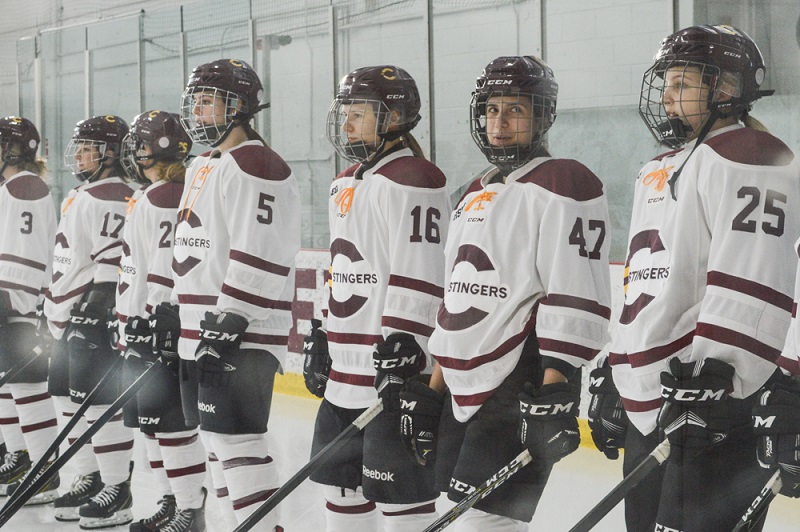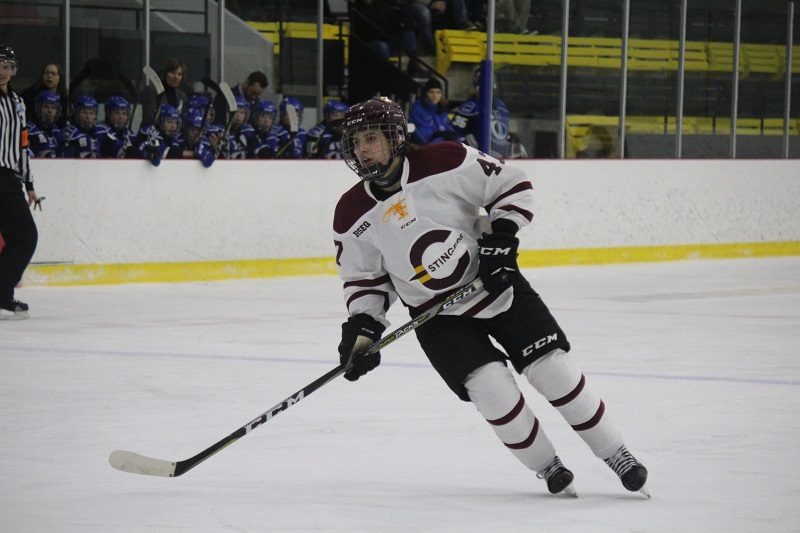Alexandria D’Onofrio has not missed a game during her five years with the Stingers
Alexandria D’Onofrio has not missed a single game in her five years with the Concordia Stingers women’s hockey team. For D’Onofrio, who plays forward, the dream of playing in university after growing up in Rivières-des-Prairies (RDP)—an area not known for women’s hockey—has been her biggest accomplishment.
“A lot of the girls on the team call me the ‘mother figure’ of the team,” D’Onofrio said. The psychology student has taken what she has learned through hockey and applied it to her own life. “Hockey has taught me discipline and maturity. There’s always an obstacle that is in the way to make you better.”
For D’Onofrio, obstacles have been very much at the forefront of her hockey life since youth. Growing up in RDP, D’Onofrio had the challenge of playing with the boys early on, until she reached the bantam level. Having been inspired by her brother who played hockey, she took to the game in stride.
“I played AA in atom and peewee,” she said. Atom hockey is for ages nine and 10, while peewee is for 11 and 12-year-olds. “Then, they made a rule that you had to switch over to girls’ hockey once there was contact [in bantam]. So, I had to switch over.”

It wasn’t long after making the switch to girls’ hockey that D’Onofrio left her bantam team in RDP to play on a co-ed team for her high school, Lester B. Pearson in Montreal-North. She returned to play with the girls’ team in her second year of bantam, while also playing with her high school team. From there, she played midget girls’ hockey until she was recruited to play for the Dawson Blues in CEGEP.
“Dawson was a great experience, and I loved my two years there,” D’Onofrio said. “The only problem was that we only had three practices a week, so coaches don’t see you that often.”
In the 2011-12 season with the Blues, D’Onofrio scored four goals and four assists in 28 games. The team also finished second in the regular season standings and managed to win the Réseau du sport étudiant du Québec (RSEQ) bronze medal that season.
The 2012-13 season was not as good for the Blues, as they finished with a 3-16 record in a newly-created top division. During that season, D’Onofrio scored three goals and committed to the Stingers for the 2013-14 season.
“Being chosen to play in university, being able to stay [close to] home and getting picked up by Concordia is my biggest achievement,” she said.

D’Onofrio’s five years at Concordia have been marked by a constant presence on the ice. Having played every regular-season game since her first season, she has established herself as a crucial force for the Stingers. So far, she has played over 90 regular-season games with the Stingers. If she plays every game for the rest of this season, she will have played exactly 100 games in the maroon and gold colours.
To date, D’Onofrio’s best season was in 2016-17 when she scored two goals and two assists in the regular season and added another goal in the playoffs. The Stingers lost to the McGill Martlets in the RSEQ final and finished in fourth place at the national championship last March.
D’Onofrio’s future in hockey as a player is uncertain. However, she said she believes she has a future in coaching. “We run a hockey camp at Concordia, and I enjoy it to the fullest,” she said. “I don’t see myself as a head coach right now, but I would enjoy taking on a consistent role like that.”
With half a season still remaining as a player, the focus for D’Onofrio and the Stingers remains clear—to win a championship.
“I know this is my last year. It’s the most important thing to me that our team finishes as best as we can,” she said. “Hopefully we win a medal. I’d like to top last year’s nationals experience.”
D’Onofrio takes pride in knowing that not many women from her neighbourhood have played university hockey. She credits her parents and the staff at Concordia for pushing her to be better in the face of adversity. Whether it was playing in a boys’ league or dealing with unfavourable seasons, her focus and determination have always been at the forefront in her hockey career.
“I love the sport, but I’m not sure if it’s for me to continue onwards,” D’Onofrio said. “I had five great years here, so me leaving the sport will be tough, but I’ll know that I achieved the max that I could have achieved.”
Main photo by Alex Hutchins




